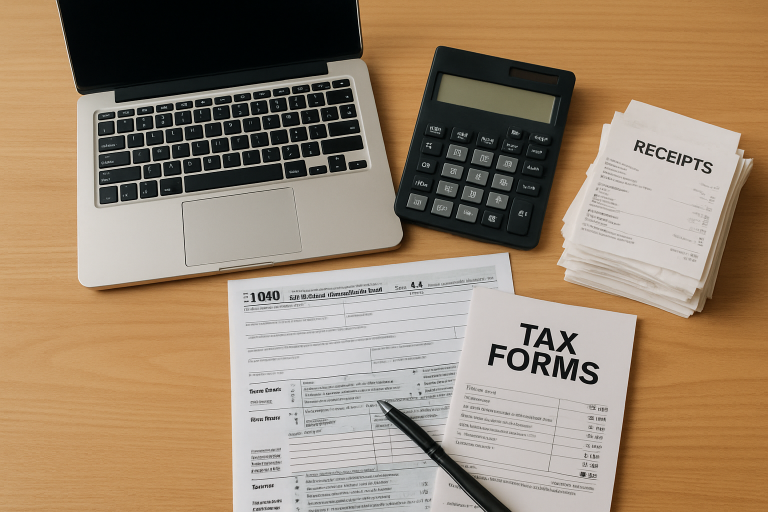Key Takeaways
- Accurate accounting is essential for tax compliance and financial health.
- Utilizing technology and professional support streamlines the tax process.
- Staying updated on tax law changes and audit readiness are critical.
- Well-organized records lower the risk of errors and IRS penalties.
Table of Contents
- Maintaining Accurate Financial Records
- Organizing Expenses Effectively
- Staying Updated on Tax Laws
- Utilizing Technology for Compliance
- Preparing for Audits
- Seeking Professional Assistance
- Final Thoughts
Introduction
As tax season approaches, individuals and businesses can experience heightened anxiety about ensuring everything is handled correctly. Precise accounting lays the foundation for straightforward tax preparation—supporting compliance with tax laws and a clear, reliable understanding of your finances. From efficient record-keeping to knowing which documents to retain and for how long, choosing the right accounting partner can help set your mind at ease and position you for financial success.
Tax compliance is nonnegotiable in today’s regulatory landscape. Whether you operate a small business or are an independent contractor, keeping your records in order helps you avoid costly mistakes. Quality accounting practices make the difference, ensuring you remain organized and are always ready for tax time, audits, or financial decision-making.
Beyond the stress of tax season, there’s an added incentive for business owners: strategic financial management can help you take advantage of allowable deductions and optimize year-round operations. By establishing effective daily processes, you lay the groundwork for both compliance and growth.

Organizing Expenses Effectively
Poor expense categorization is among the most common reasons for errors during tax season. Modern accounting software can automate much of this process, ensuring each expense is sorted and tagged appropriately—office supplies, rent, or business travel. This approach creates a system where you can easily identify deductible items and back up each claim with supporting documentation.
Systematic expense organization opens the door to valuable insights about your spending patterns, uncovering areas where your business could save money or optimize resources. Staying organized also means that, should the IRS request additional documentation or clarification, you can provide it quickly and confidently.
Staying Updated on Tax Laws
The tax code constantly evolves, and failing to stay up to date can inadvertently result in noncompliance. Major publications, such as Forbes, regularly highlight the latest legislative changes and their implications for individuals and businesses. Subscribing to reputable newsletters or attending online seminars gives you access to timely updates and clarifies new opportunities for credits or deductions you might otherwise miss.
In addition to self-guided learning, engaging professional accounting services may be appropriate for those seeking to interpret new tax developments better or ensure accurate application of changing rules. A qualified CPA can help review records, identify potential adjustments, and maintain yearly compliance. Establishing an ongoing relationship with a local CPA can also support consistent monitoring of financial statements and more proactive planning for future filings.
Scams targeting taxpayers are especially prevalent during tax season. The IRS issues annual warnings, such as the “Dirty Dozen” list, to help people recognize and avoid new threats. Staying vigilant and informed boosts your confidence in handling returns and protects your business and personal information from fraudsters.
Utilizing Technology for Compliance
Accounting technology has transformed how businesses and individuals approach tax compliance. Tools that sync with your bank, automatically import transactions, and categorize spending not only save time but also improve record accuracy. Cloud-based accounting platforms offer the added benefit of secure, remote access and real-time collaboration with accountants or tax preparers, ensuring deadlines are met even if you’re traveling or working outside regular business hours.
In today’s digital-first environment, leveraging these tools means effortless back-ups, reduced paper clutter, and on-demand reporting that accelerates audit response times. Consider cloud platforms and specialized tax software as investments in efficiency and peace of mind.
Preparing for Audits
No business or individual wants to face an IRS audit, but with clear and easily accessible records, the process becomes far less daunting. Digital receipt management platforms, automated reconciliation, and periodic review meetings with your accountant foster a state of readiness. When every transaction is accounted for, and you understand the rationale behind deductions, you’re more prepared to answer auditor questions and resolve any issues quickly.
This readiness also reduces stress for you and your team—there is no scrambling to assemble missing documents and no anxiety about forgotten transactions. A proactive organization pays off, leaving you focused on continued business growth rather than tax season headaches.
Seeking Professional Assistance
Personalized support from a seasoned accountant can make all the difference during tax season and throughout the year. Experts can demystify new or complex regulations and offer tailored advice that may reveal tax-saving opportunities you hadn’t considered. By partnering with a professional, you access both guidance and assurance—your returns are accurate and your records comply with the latest standards.
An expert can help you establish lasting best practices, from structuring your payroll to optimizing quarterly estimated payments. This holistic view of your finances supports growth and security regardless of how tax regulations evolve in the future.
Final Thoughts
Proper accounting is more than a compliance requirement—it’s a strategic advantage that makes tax season manageable and sets the stage for ongoing success. By maintaining organized records, leveraging modern technology, staying aware of regulatory changes, and seeking professional guidance, both individuals and business owners can minimize the risks of audits or penalties and position themselves for growth. Invest in smart accounting habits now and enjoy greater confidence and clarity year-round.




